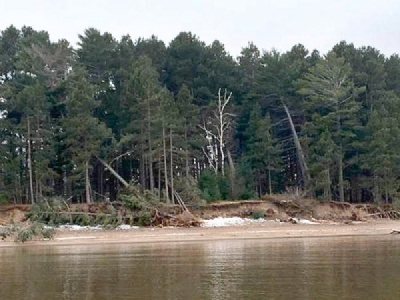
Posted on November 27, 2017
By John Myers, Duluth News Tribune
The U.S. Army Corps of Engineers is considering using sand dredged from the Duluth-Superior Harbor to resupply rapidly eroding Lake Superior beaches along Minnesota Point.
The erosion problem, spurred by near-record-high lake levels and made worse during the big lake’s epic storms, has eaten away hundreds of thousands of cubic yards of sand — reaching so far onto shore that mature trees in the Minnesota Point forest are falling into the lake.
Shipping channels in the harbor are dredged periodically to keep them deep enough for lakers and salties to carry full loads. The dredge material can be sucked off the bottom with giant vacuums and pumped, through tubes, to wherever it’s needed — even miles away.
Supporters say adding tons of new sand may be the only way to buffer the beaches along Minnesota Point — also known as Park Point — if Lake Superior levels remain high.
“The life of Park Point beaches and the preservation of the old-growth trees within the natural area on Park Point may depend on it,” said Jim Sharrow, director of port planning and resiliency for the Duluth Seaway Port Authority.
The earliest that can happen, however, is next summer when the next maintenance dredging is scheduled to occur. But any action is more likely in 2019, Corps officials noted.
Before then, the Corps and the Minnesota Department of Natural Resources would have to agree on a dredge disposal plan and so-called 401 certification under the federal Clean Water Act.
Marie Strum, chief of the Engineering and Technical Services Division at the U.S. Army Corps of Engineers’ Detroit office, earlier this month viewed some of the worst eroding sections of Minnesota Point from a boat and said she was surprised by how much sand had been pulled away from the beach.
“We’re just in preliminary discussions with the MPCA and DNR on starting beach nourishment in Duluth again,” Strum told the News Tribune. “It was pretty impressive, when we took a boat out there, to see how much sand was gone. There are old-growth pines just crumbling into the lake.”
Source: Duluth News Tribune





